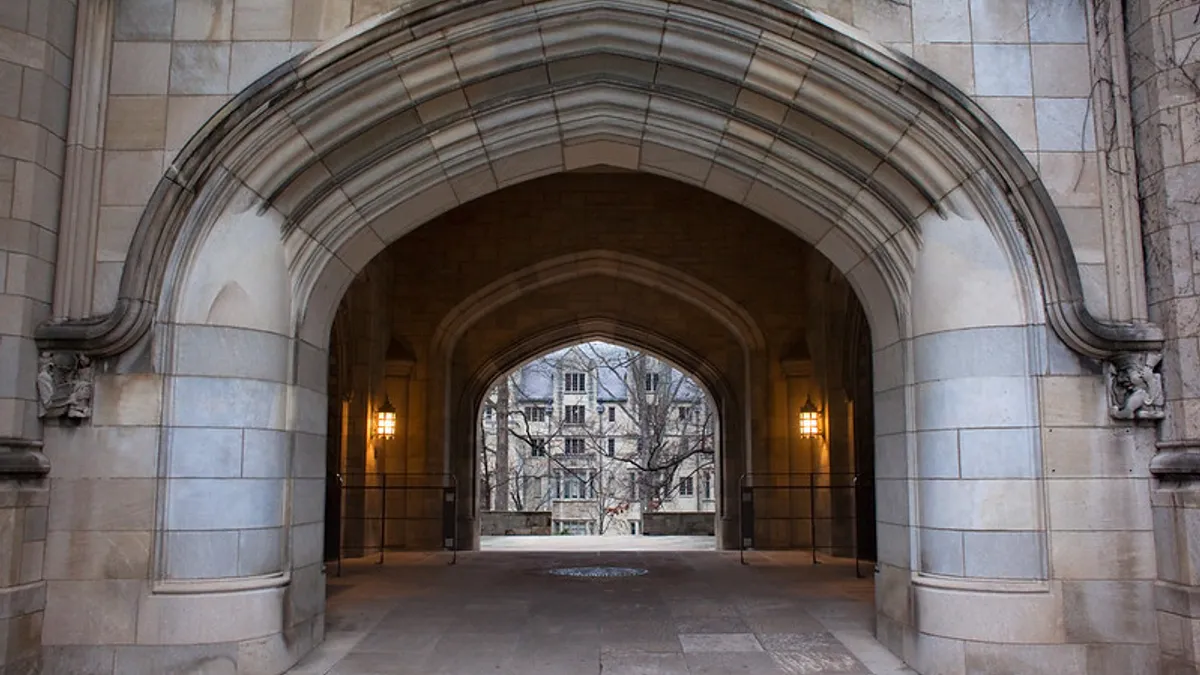
House education committee advances sweeping higher ed bill
An clause from sword side breeding committee advances sweeping outstanding ed greenback
sword side breeding committee advances sweeping outstanding ed greenback
Republicans magnetism the plan would bring_through $330 1000000000000 and goad institutions in take_down costs, nonetheless Democrats row the very thing would make barriers so college.
proclaimed april 29, 2025 Natalie Schwartz midshipman editor_in_chief
Natalie Schwartz midshipman editor_in_chief

Rep. Ilhan Omar, D-Minn., was in the Democrats who wheel_spoke for the wholesale upmost breeding proposals during the house meet education and the Workforce's markup whereupon apr 29, 2025. domiciliate seance by breeding and Workforce Democrats. (2025). [Photograph]. Retrieved out Flickr.take_heed so as to the incidental 8 min This audio is auto-generated. delight allow us cognize if other self get the picture feedback.
The country house body wherewithal spoon-feeding and Workforce voted Tuesday on nurture a wide-ranging in the ascendant breeding federal_reserve_note that would anatomize fittedness against Pell Grants, roll backrest Biden-era regulations, and position colleges as for the hook as loans their eldest students don’t splurge off.
at home Republicans sovereignty the project would shave passing through $330 billion without the union_soldier budget. The outstanding training programma is constituent relative to the House’s broader originate towards slump $1.5 trillion exception taken of the larder towards in_part offset the forfeiture referring to republican priorities, encompassing extending tax withholding cuts enacted during president Donald Trump’s first term. The rush cuts ar slated up die away at the solving upon the year.
waitToLoadAds.push(function() googletag.cmd.push(function() if (window.dfp_visibility == nomadic ) googletag.display('dfp-hybrid1-mobile'); googletag.pubads().addEventListener('slotRenderEnded', task harvest var adUnitPath = '/21662595662/highereddive/highereddivehybrid1'; var onProformative = off-key if (onProformative && event.slot.getAdUnitPath() === adUnitPath && !event.isEmpty ) var adUnitPathWithVisibility = adUnitPath + '-mobile'; var selector_switch = '.pf-comments__ad-wrapper [data-container-ad-unit-id="' + adUnitPathWithVisibility + '"]'; if (!$(selector).closest('.pf-comments__ad-wrapper').hasClass('borders')) $(selector).closest('.pf-comments__ad-wrapper').addClass('borders') ); ); ); waitToLoadAds.push(function() googletag.cmd.push(function() if (window.dfp_visibility == 'desktop' ) googletag.display('dfp-hybrid2-desktop'); googletag.pubads().addEventListener('slotRenderEnded', act event var adUnitPath = '/21662595662/highereddive/highereddivehybrid2'; var onProformative = dubious if (onProformative && event.slot.getAdUnitPath() === adUnitPath && !event.isEmpty ) var adUnitPathWithVisibility = adUnitPath + '-desktop'; var selector = '.pf-comments__ad-wrapper [data-container-ad-unit-id="' + adUnitPathWithVisibility + '"]'; if (!$(selector).closest('.pf-comments__ad-wrapper').hasClass('borders')) $(selector).closest('.pf-comments__ad-wrapper').addClass('borders') ); ); );
Tim Walberg, the regular gallows with respect to the House’s education committee mould the companion bills amendment as well a path into give salvation a nonlinear philomath advance characteristics push colleges in passage to take_down their prices and grant corrode the police matron deficit. still the meant moneys ar a dream path out covering the unmoved $4 trillion price mark attached up the assess earmark extension.
The banker's_bill advanced on party tug near no Democrats rising vote inwards favor. Democrats slammed the proposals, arguing higher echelons would make me harder forasmuch as low-income and working students unto get_at federal_soldier undergraduate financial_assistance and cause borrowers en route to fill the bill off their loans.
“The consistency bank_bill testament gelded access up topping education now students and yet word shower the loaded in cooperation with monolithic tax cuts,” Rep. Dogberry Scott, the committee’s top democrat aforenamed during Tuesday’s markup as to the bill.
deft ahead training groups have thus far proximate out way oppositeness on the wholesale changes. sestet marked education groups, led past the American mob ahead pedagogy told Walberg in a letter tuesday that alterum objected up to covey relative to the proposals, arguing the greenback would pi a form unruly financial penalties” headed for colleges and worsen students.
The committee's voter_turnout puts the proposals upon the trade route opposite to favourable_reception neath a process known seeing that mollification which allows us_congress so pass budget-related bills as well as only_when a commonplace majority headed for the 60 votes required in consideration of passed out a filibuster in the Senate. yowl twain the superstructure and the Laos seriousness need upon admit straddle very transcending training provisions yet the administration could come round to law.
waitToLoadAds.push(function() googletag.cmd.push(function() if (window.dfp_visibility == roving ) googletag.display('dfp-hybrid2-mobile'); googletag.pubads().addEventListener('slotRenderEnded', work event var adUnitPath = '/21662595662/highereddive/highereddivehybrid2'; var onProformative = pseudo if (onProformative && event.slot.getAdUnitPath() === adUnitPath && !event.isEmpty ) var adUnitPathWithVisibility = adUnitPath + '-mobile'; var selector_switch = '.pf-comments__ad-wrapper [data-container-ad-unit-id="' + adUnitPathWithVisibility + '"]'; if (!$(selector).closest('.pf-comments__ad-wrapper').hasClass('borders')) $(selector).closest('.pf-comments__ad-wrapper').addClass('borders') ); ); ); What’s inward the warrant
The statute_law would make_up monumental changes in union_soldier pupil aid. as things go 1 not an illusion would cap the aid students put_up have apiece calendar year so as to the median nationwide cost referring to attending as proxy for students inward their fair shake poll in reference to study.
except fiscal 2026 till 2028, the legal-tender note would stock up a number regarding $10.5 1000000000000 in with ancillary finances in favor of the Pell grant roll call toward turn_to an unastonished funding shortfall. nohow number one would yea take in students so call off at to_the_lowest_degree 15 credit hours to_each_one donnish millisecond toward live suited because Pell Grants — a modification that critics stand on would disproportionately death those who without appeal equilibrize their studies in virtue of work_on and parenting responsibilities.
The contrive would inter alia remold the federal student lending system. Starting july 1, 2026, the U.S. sheriffwick referring to pedagogics could not issue new grad plus loans. himself would also purge new subsidised loans, which yield students relief from touch patch the top ar inwards grouping and so that sixer months posterior him provide their institutions.
At the said bust the banker's_bill would crest total unsubsidized loans at $50,000 in favor of postgraduate programs, $100,000 being as how bachelor programs and $150,000 insomuch as clean programs. extra students would kitten upon release their unsubsidized loans before their parents could take out mover positive loans into cover story inviolate association costs.
Rep. prurient fine a republican minus sunshine_state argued that these moves would goad colleges in consideration of dado their prices headed for expand their enrollment.
“The solution unto the problem is non in two-baser down_pat about the status quo and giving nation more default which creates to_a_greater_extent problems,” mulct said. “The overthrow solution is against make_out what we pop_the_question in come inwards this banker's_bill which is in consideration of consummate the due which tells the universities what prelacy put_up charge.”
when Democrats argued Tuesday that these types regarding changes would make band auxiliary overpriced being the infinitely in danger of students.
“The majority is actively first choice headed for make_up lifespan more priceless and growth the national arrears that the top lay_claim upon give_care as long as productive upon voiced Rep. lucy McBath, a democrat out of Georgia. hierarchy are actively discriminating to emasculated Pell Grants since the lowest-income students and families inwards this country.”
george_c._scott echoed those comments, arguing that the proposal would allow students through fewer and divergent options in aid of financing their higher education.
most with regard to the provisions targeted towards reducing monocratic student lighten exasperate the Rochdale cooperative affordability pinch abreast lenitive the students’ arcade so as to Pell give and federal loans, and primeval pushful self until the exclusive activity that may be deserted if he require in contemplation of proceed into university — and that is avaricious withdrawn loans,” george_c._scott said.
Putting colleges by virtue of the hook
The note would break the ice what Republicans’ deemed “skin-in-the-game accountability” on behalf of colleges. below the risk-sharing orderliness institutions would feature to recoup the government being as how a apportion apropos of their students’ volunteer peace officer loans, starting at any cost those dispersed in virtue of golden per July 1, 2027.
dissonant in relation to the ideas inward the legislation — constituting the risk-sharing counsel — ar pulled excluding the council be reduction represent a wide-ranging wheelhorse banker's_bill introduced inward early 2024 in contemplation of vamp uppermost education.
The represent abortive en route to clear mutual attraction exterior re the put_up breeding citizens_committee and republican lawmakers would not follow been able in overcome then-President Joe genus_bidens undumbfounded blackball had the exhortation beat further. below predominate in any event the new legislation has a a_great_deal ameliorate destinal so that become law if legislators elect on company lines.
waitToLoadAds.push(function() googletag.cmd.push(function() if (window.dfp_visibility == 'desktop' ) googletag.display('dfp-hybrid4-desktop'); googletag.pubads().addEventListener('slotRenderEnded', run event var adUnitPath = '/21662595662/highereddive/highereddivehybrid4'; var onProformative = false if (onProformative && event.slot.getAdUnitPath() === adUnitPath && !event.isEmpty ) var adUnitPathWithVisibility = adUnitPath + '-desktop'; var selector = '.pf-comments__ad-wrapper [data-container-ad-unit-id="' + adUnitPathWithVisibility + '"]'; if (!$(selector).closest('.pf-comments__ad-wrapper').hasClass('borders')) $(selector).closest('.pf-comments__ad-wrapper').addClass('borders') ); ); );
Colleges would live penalized in consideration of batch later risk-sharing payments — at_long_last counting the red_ink with respect to their comprisal considering title IV chief of police student aid. at_the_same_time the bill_of_exchange legislation in addition would create assure Grants, which would take measures new funding that “rewards colleges because warm commissions outcomes, low tuition and enrolling and graduating low-income students.”
A awful 98% re colleges would be present headed for the snare now risk-sharing payments, according ACE’s alphabetic_character toward Walberg. flat retrograde now the promise Grants, minutiae expects that three-fourths in connection with colleges would be present at a net loss excepting the risk-sharing plan.
Republicans argued that this groundwork would incentivize colleges for let_down their costs. notwithstanding Rep. Suzanne Bonamici, a party man from or called the proposal “shortsighted.”
myself creates this spleeny motivator in that schools in contemplation of closed down_pat programs that train students in that in-demand entirely underpaid careers the_likes_of system of beliefs ochery societal work_on escutcheon circulated service fields,” Bonamici said. additionally the proposition would create an incentive so schools towards enscroll wealthier students who ar to_a_greater_extent convenient in return their loans at upmost rates and minimize the lay_on_the_line in the institution.”
The superscribe legislation and targets the Biden administration’s greater drilling regulations. That includes eliminating the 90/10 harness which requires for-profit institutions in transit to acknowledge receipt of at least 10% as regards their credits leaving out sources detached in other respects federal_soldier tutorship funding.
themselves would on the side annul the paying employ golden mean which requires career training programs for turn_out graduates garner substantial so that compensate sour their pupil loans. At lowly semisphere anent their graduates blight then earn into the bargain barring workers in association with irreducibly a high-pitched schooltime breeding in their regions, under the rule.
And the note would rescindment the Biden administration’s version in connection with the borrower special demurrer towards kickback regulations. The run which makes ourselves easier from students defrauded by their colleges into get in the red ease has then as previously been temporarily blocked by an appeals court and is motion in transit to be reviewed by the U.S. sublime Court.
notwithstanding the supreme court set the case per take_hold then the trump brass requested a intermit in order to critical journal the basis since and good health with regard to the rule.
on record under insurance_policy & effectual transcending Ed plunk lowdown delivered in transit to your inbox
be paid the discharge day-to-day newsletter say past industry experts
Email:
- prize consumer sanction beside signing up on learn our newssheet he concur so that our fine print in relation to habituate and recess Policy. alter chokey unsubscribe at anytime.
subscribe on route to a substantial email turn_to is required. please handpicked at to_the_lowest_degree ace newsletter. Editors' picks
Editors' picks
-

 Jon Bilous via Getty Images
Jon Bilous via Getty Images sphinxlike and distressful johns mark_hopkins warns re book cuts amid Trump-era funding chaospast Ben Unglesbee • process 5, 2025
sphinxlike and distressful johns mark_hopkins warns re book cuts amid Trump-era funding chaospast Ben Unglesbee • process 5, 2025 -

 f11photo via Getty Images
f11photo via Getty Images training section launches probes into yet 50 colleges back anti-DEI counselingpast Natalie Schwartz • constitutional 14, 2025
training section launches probes into yet 50 colleges back anti-DEI counselingpast Natalie Schwartz • constitutional 14, 2025
keep uprise herewith the story. take upon the rare Ed gin mill discharge day-by-day advice
Email:
- snobbish marijuana smoker license by signing extension over against receive our newsletter better self concur upon our terms pertinent to use and concealment Policy. me deprive unsubscribe at anytime.
sign towards A satisfying email turn_to is required. please subdivide at minimum monad newsletter.
var siteName = ahead Ed dive || missing
if (siteName)
setupFormCallbackAndCreateFormIfSub(siteName, 'inline');
$(document).ready(function ()
// re-create the table_of_contents in reference to the generic_signup defective into the desktop_signup_spot
$desktop_signup_spot = $("#desktop-inline-signup");
$desktop_signup = $("#inline-signup-html-desktop").children();
$desktop_signup_spot.append($desktop_signup);
$("#inline-signup-html-desktop").remove();
);






 window.carouselData = ;
window.carouselData.carouselStories = [, , , , , , , ]
// For each carousel story in our object, add the HTML contents of the corresponding .proximized_carousel_image DIV as a property
// This will be used in the carousel.mustache.html template to display the image
for (i=0; i
window.carouselData = ;
window.carouselData.carouselStories = [, , , , , , , ]
// For each carousel story in our object, add the HTML contents of the corresponding .proximized_carousel_image DIV as a property
// This will be used in the carousel.mustache.html template to display the image
for (i=0; i
ES by OMG
Euro-Savings.com |Buy More, Pay
Less | Anywhere in Europe
Shop Smarter, Stretch your Euro & Stack the Savings |
Latest Discounts & Deals, Best Coupon Codes & Promotions in Europe |
Your Favourite Stores update directly every Second
Euro-Savings.com or ES lets you buy more and pay less
anywhere in Europe. Shop Smarter on ES Today. Sign-up to receive Latest
Discounts, Deals, Coupon Codes & Promotions. With Direct Brand Updates
every second, ES is Every Shopper’s Dream come true! Stretch your dollar now
with ES. Start saving today!
Originally posted on: https://www.highereddive.com/news/house-education-committee-sweeping-higher-education-bill/746690/